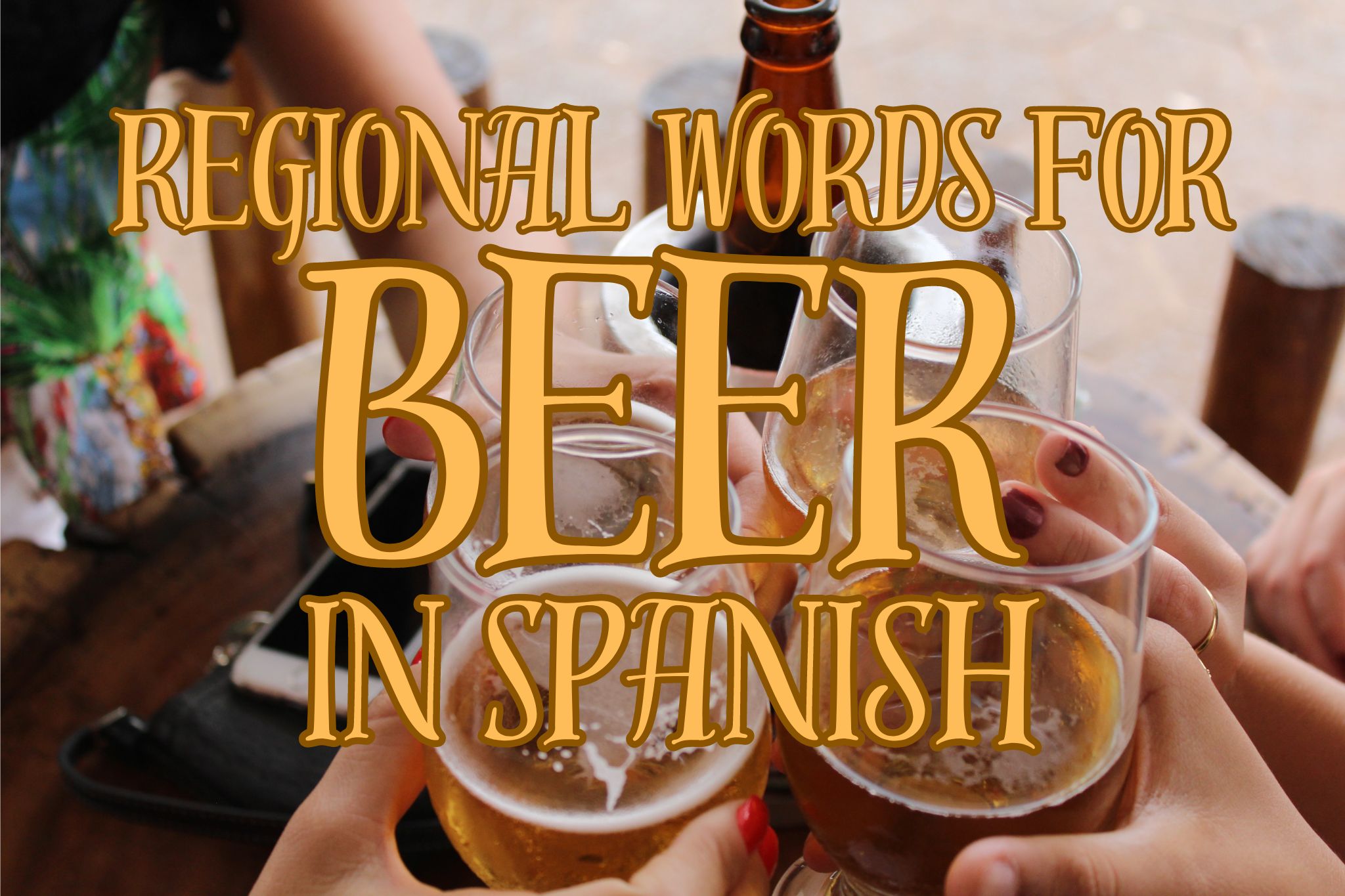¡Salud! An International Guide to Beer in Spanish

Get our free email course, Shortcut to Conversational.
Have conversations faster, understand people when they speak fast, and other tested tips to learn faster.
More infoWhen it comes to enjoying a cold one, it’s not just the taste that differs from one corner of the Spanish-speaking world to another. Even the way you ask for a beer can vary wildly! While “cerveza” is the universal term for beer in Spanish, each country adds its unique flavor to the language, coming up with slang words and phrases that make ordering a cerveza a delightful linguistic adventure.
That’s why, in this post, we’ll introduce the different words for beer in Spanish, depending on the region where you’re indulging. So grab your favorite brew, clink your glasses together to cheers with your friends, and let’s dive into the fascinating world of beer slang in Spanish!
Chela – Mexico, Ecuador, Guatemala, Chile, Peru
Chela is drawn from the Mayan word “chel,” which means “blue.” “Chel” started out as a slang way to refer to a blonde person, since they often had blue eyes. This later led to a clever association with light hair and the classic golden hue of beer. Since then, the term chela has spread to several South American countries, making it a unique way to describe your favorite brew.
Cheve – México
Mexico actually has quite a few ways to call beers in Spanish. Although its origin isn’t entirely clear, one explanation is that cheve is an evolution from “chela.” Although less common than “chela,” cheve is still widely used as a form of beer slang in Spanish in some regions.
Caguama – Mexico
With caguama, Mexico is at it again with the beer slang. Inspired by the sea turtle, a caguama is a 1-liter beer bottle. The association between the beer bottle and the sea turtle likely comes from the fact that the shape of these larger beer bottles roughly resembles the shape of a sea turtle’s shell. The term caguama is a fun and colloquial way for Mexicans to order these larger bottles of beer.
Elodia, Helodia – Mexico
We can all agree that a cold beer is the best beer, and that’s the whole point behind this term. Helodia comes from bien helada, meaning very cold in Spanish.
Lagarto – Cuba
Don’t worry, although lagarto is the Spanish word for “lizard,” they have little to do with beers in Cuba. The truth is that this word for a beer in Spanish comes from the term “láguer,” which is short for the German “Lagerbier.” And even if, technically, a lager normally refers to a specific variety of beer, Cubans use it to refer to any type of beer. So, lagarto joined the party as a beer synonym, purely because it sounds like “láguer.”
Pinta – Panama
Just order a pinta if you’re in Panama and in the mood for a pint. They just might not always serve it in a genuine pint glass.
Fría – Cuba, Venezuela, Puerto Rico
If you’re in these countries and really want a cold beer, instead of ordering a cerveza fría, you can just ask for una fría, and you’ll get a cold one.
Birra – Argentina, Venezuela
As a matter of fact, birra is the Italian word for beer, probably introduced by Italian immigrants in both of these countries. It’s a delightful blend of linguistic influences, much like the melting pot of flavors in a rich craft beer.
Curda – Venezuela
While not as commonly used as “birra” or “fría,” una curda is still part of Spanish beer slang that you might encounter. Additionally, it can also be employed as an adjective to describe a person who is inebriated, calling them curdo or curda, depending on their gender.
Pola – Colombia
Colombians refer to beer as pola due to a historical connection with the Colombian beverage company Bavaria. In 1910, Bavaria introduced a beer called “La Pola” to commemorate the centenary of Colombia’s independence. This beer featured the image of Policarpa Salavarrieta, a Colombian independence heroine. Since then, pola has become an affectionate beer slang in Spanish used in Colombia.
Biela – Ecuador
Biela has the same roots as “helodia”: this word for beer in Spanish comes from the contraction of the expression bien helada, which means very cold. The term was so popular, that now there’s a beer brand named Biela!
Pescuezuda – Ecuador
This is a fun one. Pescuezuda is a very colloquial adjective that means “long neck.” It’s a delightful nod to the distinctive shape of beer bottles with elongated necks. So, if you’re visiting Ecuador and crave a bottle of beer, make sure to have a cold pescuezuda.
Cerbatana – Peru
In Peru, the term cerbatana is a playful and colloquial way to refer to a beer. The word cerbatana itself means “blowgun” in Spanish. The use of cerbatana for beer is likely because the beginning of both words, “cerba,” sounds similar, making it a clever and imaginative way to refer to this beloved beverage in a lighthearted manner.
Caña – Spain
If you find yourself in Spain, chances are you’ve heard friends chatting about grabbing a caña quite often. While it’s commonly used as Spanish slang for beer, it’s more about the size of the serving. Essentially, una caña refers to a beer poured into a small glass typically holding around 200 to 250 milliliters (around 7 or 8 ounces).
Litrona – Spain
In Spain, a litrona is a colloquial term used to refer to a large beer bottle containing one liter of beer. It’s a popular choice for sharing among a group of friends or during casual gatherings.
Conclusion: Beer in Spanish
That was quite the journey through the delightful world of beer slang in Spanish!
As the Spanish language spreads its colorful wings across the globe, it’s no surprise that there are many ways to say beer in Spanish. After all, with a language as vast as Spanish, sometimes there are multiple words for one thing. Another example is the result of too much beer the night before, so check out our companion post with different ways to describe a hangover in Spanish slang!
Slang, as we’ve seen, is an important and playful part of language learning. So, why not share this post with your amigos and amigas and practice using these fun beer-related terms next time you’re enjoying a cold one together? Whether it’s a una chela in Mexico, a una caña in Spain, or una cerbatana in Peru, remember that the best way to explore a language is through its quirks and unique expressions. See you in the next one! ¡Salud! – ¡Cheers!
If you’ve enjoyed this linguistic adventure, you may appreciate some of our similar posts. If you liked this one with all the different words for beer in Spanish, for example, you’ll be impressed at all the possible words for friends in Spanish, for mom in Spanish, for money in Spanish, for ugly in Spanish, for bacon in Spanish, or even for a banana in Spanish!
Otherwise, if it’s other slang terms you’re after, we can point you to specific Spanish slang for each Spanish-speaking country:
- Argentine slang
- Bolivian slang
- Chilean slang
- Colombian slang
- Medellín Spanish slang words
- Medellín Spanish slang expressions
- Costa Rican slang
- Cuban slang
- Dominican Republic and Caribbean slang
- Ecuadorean slang
- El Salvadorean slang
- Guatemalan slang
- Honduran slang
- Mexican slang
- Nicaraguan slang
- Panamanian slang
- Peruvian slang
- Puerto Rican slang
- Spaniard slang from Spain
- Uruguayan slang
- Venezuelan slang words
- Venezuelan slang expressions
- Spanish curse words and insults



